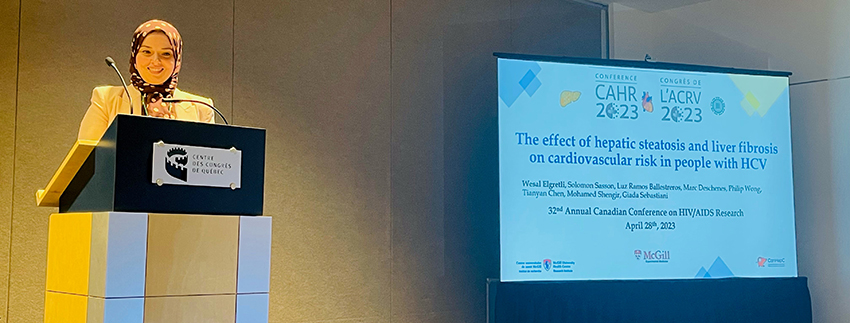
Fil d'Ariane
- Nouvelles et événements
- Nouvelles
- Content
- Une stagiaire de l’IR-CUSM honorée par l’Association canadienne de recherche sur le VIH
null Une stagiaire de l’IR-CUSM honorée par l’Association canadienne de recherche sur le VIH
Le projet de maîtrise ès sciences de Wesal Elgretli fait ressortir l’importance de se pencher à la fois sur la maladie hépatique et sur l’infection au virus de l’hépatite C
SOURCE : IR-CUSM

L’étudiante à la maîtrise ès sciences Wesal Elgretli a reçu une bourse d’études pour assister au congrès 2023 de l’Association canadienne de recherche sur le VIH, à Québec. Elle y a fait une présentation orale sur ses travaux consacrés au virus de l’hépatite C (VHC). Étudiante en médecine expérimentale à l’Université McGill et stagiaire au sein du Programme de recherche en désordres métaboliques et leurs complications à l’Institut de recherche du Centre universitaire de santé McGill (IR-CUSM), Wesal Elgretli s’est aussi vu octroyer par le Réseau Canadien sur l’Hépatite C une bourse de deux ans très convoitée.
Le projet qui a valu la reconnaissance à Wesal Elgretli est intitulé « The effect of hepatic steatosis and liver fibrosis on cardiovascular risk in people with HCV » (L’effet de la stéatose hépatique et de la fibrose hépatique sur les personnes atteintes du virus de l’hépatite C (VHC) présentant un risque de maladie cardiovasculaire). Comme l’explique Wesal Elgretli : « Dans le monde d’aujourd’hui, où l’on a abondamment recours aux antiviraux à action directe pour lutter contre le VHC, l’éradication du virus peut être assimilable à une forme de soins cliniques sous-optimale, à moins de se pencher simultanément sur la maladie hépatique résiduelle et sur ce virus. L’objet de l’étude que j’effectue est aussi de mieux comprendre la relation existant potentiellement entre un risque élevé de maladie cardiovasculaire et la stéatose hépatique ainsi que la fibrose hépatique grave chez les personnes atteintes d’une infection au VHC. »
« Je suis très fière des progrès que Wesal Elgretli a réalisés, ajoute sa directrice, la Dre Giada Sebastiani, chercheuse à l’IR-CUSM. C’est d’autant plus impressionnant qu’elle a immigré récemment à Montréal avec sa jeune famille, en provenance de la Libye. Ses travaux pointent vers la propriété qu’a le virus de l’hépatite C d’altérer l’activité métabolique, entraînant du coup une stéatose hépatique, une résistance à l’insuline et une dyslipidémie. À une époque où l’on utilise avec succès des antiviraux à action directe très efficaces pour traiter l’hépatite C, il est important de comprendre les complications cardiométaboliques de ce virus au-delà de la maladie hépatique. »
Lire l’article dans Biomedicines (en anglais)
Le 5 juin 2023